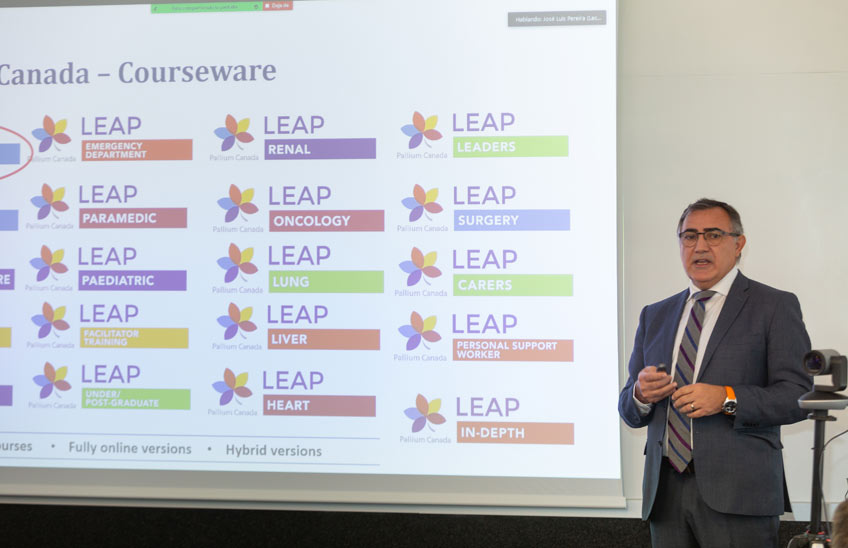José Pereira, doctor cum laude in Palliative Medicine: "Patients want us to keep trying, not to be perfect".
Palliative Medicine expert José Pereira gave a seminar on gratitude towards palliative care professionals in a multicultural context.

FotoManuel Castells<br>/José Pereira durante su defensa de tesis en la Facultad de Medicina de la Universidad
18 | 01 | 2022
"Patients want us to keep trying, not to be perfect". This is what José Pereira, international reference in Palliative Medicine and director scientist of Pallium Canada, said during a seminar offered to the team from ATLANTES Palliative Careof the Institute for Culture and Society (ICS) of the University of Navarra. The event graduate "How patients and families transmit their gratitude to palliative care professionals, considering their different cultural contexts", took place on Friday, November 26th and dealt with gratitude towards palliative professionals in a multicultural context.
During the seminar, Pereira enlightened the group of research thanks to his multicultural background - a native of Portugal, he finished his programs of study of Medicine in South Africa in 1987 and is currently working in Canada - and his work experience in rural Canada. Thus, he offered the ATLANTES team an international perspective on gratitude in palliative care, which added to the interdisciplinary approach of the ATLANTES research .
He began his exhibition by asking himself a question: How have I experienced gratitude as a health professional? From there, he recalled how British families showered him with thank you cards and how some Asian patients are overwhelmingly insistent in saying thank you. Most striking for him was how some patients from indigenous villages chose to bring him food to "take care of him back" as a way of saying thank you.
Finally, he pointed out that covid has changed the way of expressing gratitude. Pereira, who acknowledged that many patients are angry and many professionals are tired.
He said that the pandemic affects everyone and, even more so, health professionals, who no longer want to be thanked with applause, but with works, complying with the anti-covid rules.
Pallium Canada and LEAP
The day before, on Thursday 25th, Pereira read her doctoral thesis Building Primary Palliative Care Capacity Through Education at a National Level: Pallium Canada and LEAP at the University's School of Medicine, which was awarded A cum laude. The thesis explains her experience training palliative care professionals since she founded Pallium in 2000, a not-for-profit institution that seeks to build a community capable of providing accessible, quality palliative care in Canada.
It all started in 1993, when the new doctor received a patient with colon cancer who was uncomfortable and in pain. He had a small dose of morphine. Pereira, lacking knowledge of palliative care at the time, could not help him, thinking that a higher dose of morphine could lead to addiction. The patient told him that he hoped that one day doctors would be able to take better care of the sick. The expert then realised that he had not known how to care for this patient because he did not have enough training about what to do at the end of life.
Thus was born Pallium, which supports LEAP courses: courses that provide caregivers with knowledge, skills and attitudes that enhance their service at the end of life. LEAP stands for Learning Essential Approaches to Palliative Care and has more than 35,000 students.
